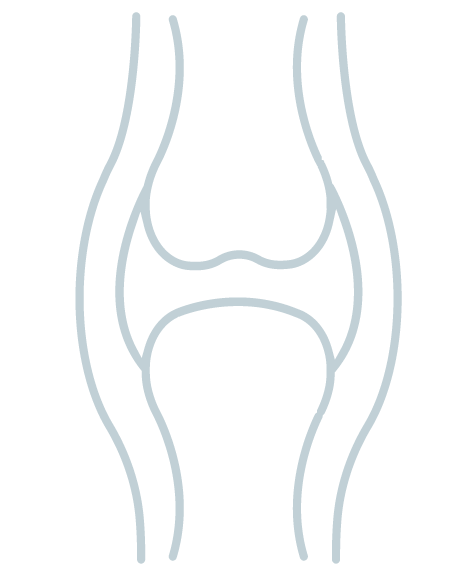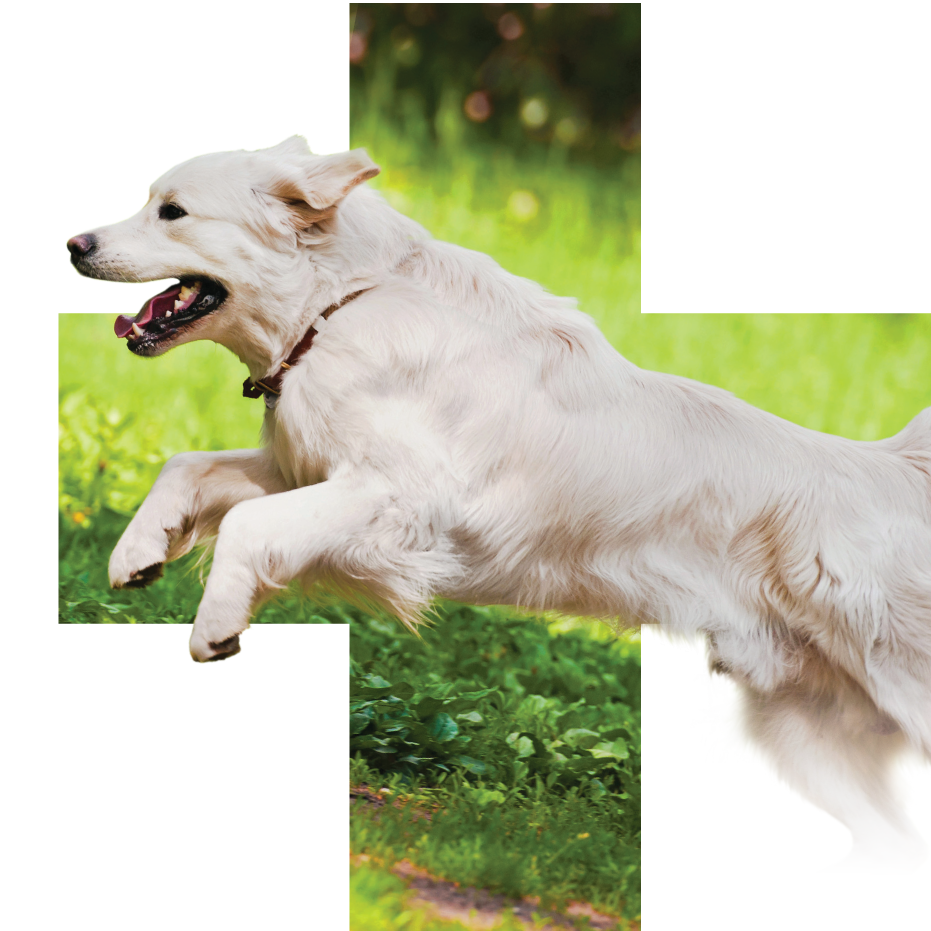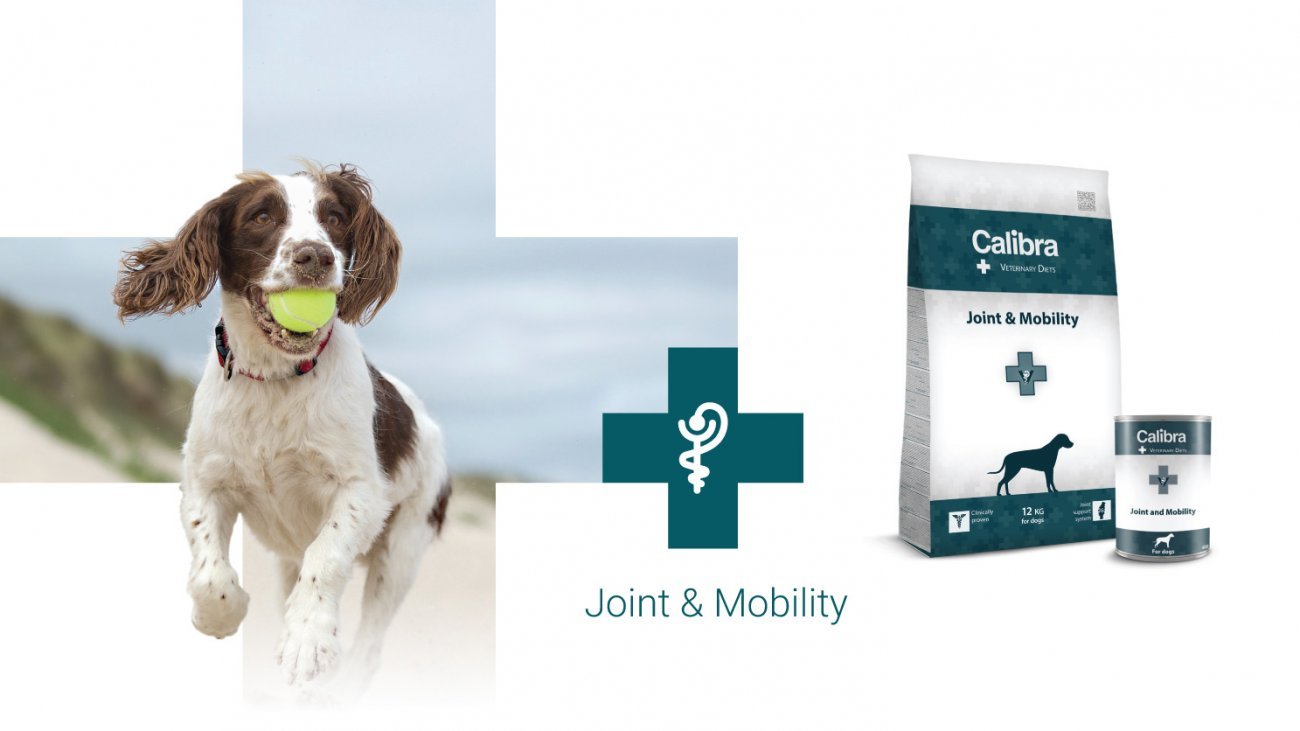VD Joint & Mobility for dogs
14. September, 2021
Did you know that osteoarthritis is one of the most common joint diseases in
dogs? If you have a dog with a diagnosed musculoskeletal problem or you are just
interested in this topic, read more.
Osteoarthritis is one of the most common orthopedic disorders in dogs
We know it’s not always easy for pet owners to recognize the symptoms of arthritis. Why?
It goes back to when our dog´s ancestors would not tolerate signs of vulnerability in pack members. Dogs react in different ways to pain depending on various factors, including their age and overall health, as well as their breed.
What are the warning signs of arthritis?
Most often, you’ll notice changes in your dog’s behavior that can indicate that something is wrong:
 Lethargy
Lethargy- Stiffness
- Limping after prolonged inactivity or after exertion
- Reluctance to move
- Aggressive or defensive reactions to touch
- Barking or whining without apparent cause
- Seeking out solitude
Signs of arthritis in dogs vary according to the severity of the disease. If, however, you notice several of the above symptoms in your dog, please see your veterinarian.
My dog has an arthrosis ...
In treating arthritis, our goal is to reduce or suppress the symptoms:
- By reducing pain and inflammation
- By slowing the progress of arthritis in dogs
- By facilitating the regeneration of damaged tissue
- By improving and maintaining joint function
There is no cure for arthritis. Fortunately, there is an effective preventative and symptomatic treatment that focuses on reducing pain and inflammation, slowing the progression of the disease, regenerating damaged tissue, and improving and maintaining joint function.
Influence of condition on arthrosis ...

Keep your dog in good condition – Do not overfeed your dog, but rather serve your dog nutritious food. Just as in humans, a balanced diet is essential to help maintain optimal weight.
Diet and nutrition are particularly important in young growing dogs. Canine obesity is the most common cause of disease resulting in overstressed joints.
Simply reducing your dog‘s weight by 10 % will result in an overall improvement in health.
Your veterinarian can recommend the most suitable diet/food for your dog’s particular needs
A proper diet and dietary supplements act preventively together – We don’t recommend a calorie-rich diet or a diet with high levels of calcium (or supplements that contain it). Divide your dog’s daily ration into smaller portions served several times a day.
 Regular exercise and an active life are essential – When your dog moves, blood circulates through the tissues, supplying nutrients and removing metabolites, thus ensuring the best conditions for regeneration. Short periods of aerobic movement more often throughout the day are ideal. The best activity, especially for dogs with more advanced arthritis and older dogs, is playing in the water or swimming. This helps with weight reduction while buildingmuscle and taking pressure off affected joints.
Regular exercise and an active life are essential – When your dog moves, blood circulates through the tissues, supplying nutrients and removing metabolites, thus ensuring the best conditions for regeneration. Short periods of aerobic movement more often throughout the day are ideal. The best activity, especially for dogs with more advanced arthritis and older dogs, is playing in the water or swimming. This helps with weight reduction while buildingmuscle and taking pressure off affected joints.
Physiotherapy is also useful in the advanced stages of arthritis and with older dogs.
How can the Calibra Joint and Mobility Veterinary Diet help your dog?
- By prolonging your dog’s active life
- By providing relief to the musculoskeletal system
- By ensuring your dog eats a balanced diet
- By avoiding potential fluctuations in the dosing of active substances as a result of the use of nutritional supplements
- Ensure the strongest concentration of chondroprotectives to support the musculoskeletal system
Joint and Mobility Veterinary Diet helps:
- With arthritis
- With joint pain
- After orthopedic operations
- Prevent musculoskeletal diseases
Joint & Mobility Complex in the Calibra Joint & Mobility VD
A unique combination of functional additives for reducing of clinical symptoms caused by
arthritis (joint inflammation) and arthrosis.
Chondroprotectives:
 Glucosamine – naturally occurring substance found in connective tissues of body, one of building blocks of proteoglycans that are part of cartilage.
Glucosamine – naturally occurring substance found in connective tissues of body, one of building blocks of proteoglycans that are part of cartilage.
Chondroitin sulfate – important structural component of cartilage.
MSM (methylsulfonylmethane) – is naturally occurring organosulphur compound, that due to its anti – inflammatory and antioxidative mode of action helps to relieve pain.
Boswellia serrata – a plant with anti-inflammatory and analgesic
properties.
Type 1 collagen – present in ligaments, bones (also skin and teeth). It’s one of the building blocks of healthy ligaments.
Vitamins and Antioxidants:
 Support overall health; help organs, the immune system, and cells to work properly.
Support overall health; help organs, the immune system, and cells to work properly.
Vitamin D is of particular importance for the musculoskeletal system, as it regulates metabolic processes in bone tissue. Polyphenols and flavonoids from green tea and turmeric strengthen the recipe’santioxidant and anti-inflammatory properties.
Omega-3 in a higher concentration:
 Sourced from krill, salmon oil, and algae. Omega-3 show anti-inflammatory effect
Sourced from krill, salmon oil, and algae. Omega-3 show anti-inflammatory effect
through many processes on the membrane and cell level by modulation of cytokines.
Krill and Its Significance for Treating the Musculoskeletal
Krill (marine crustaceans) is one of the best sources of omega-3 fatty acids (particularly EPA and DHA) and astaxanthin. Krill supports the muscle regeneration, has positive effects on the cardiovascular system (heart and blood vessels) and helps reduce clinical symptoms of musculoskeletal disorders, such as stiffness, swelling, discomfort, and pain.
 ...and finally...
...and finally...
The Calibra Joint & Mobility veterinary diet is unique on the market.
Featuring one of the highest concentrations of chondroprotectiveson
the market, it will provide visible relief for your dog.
